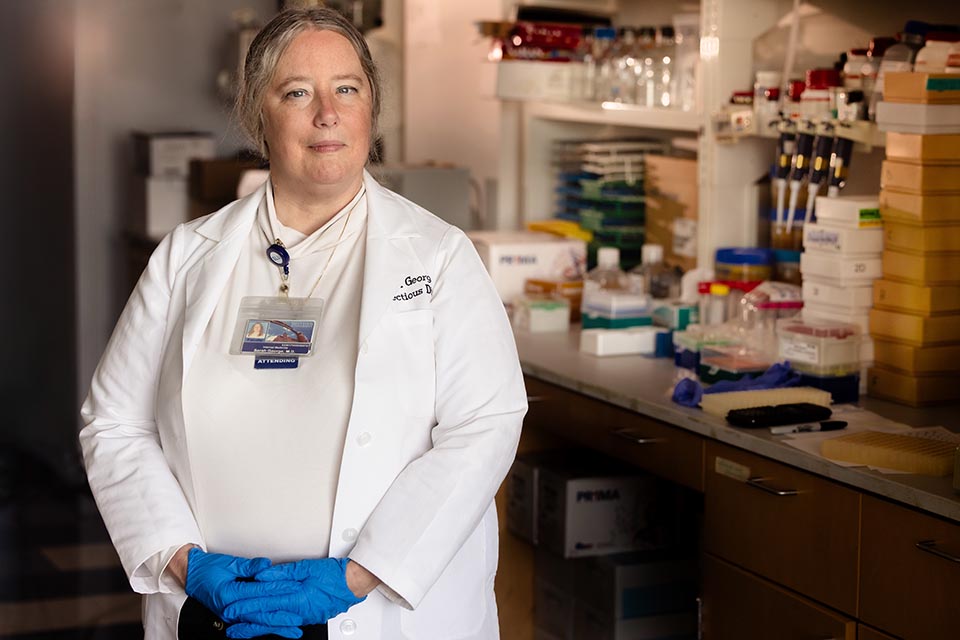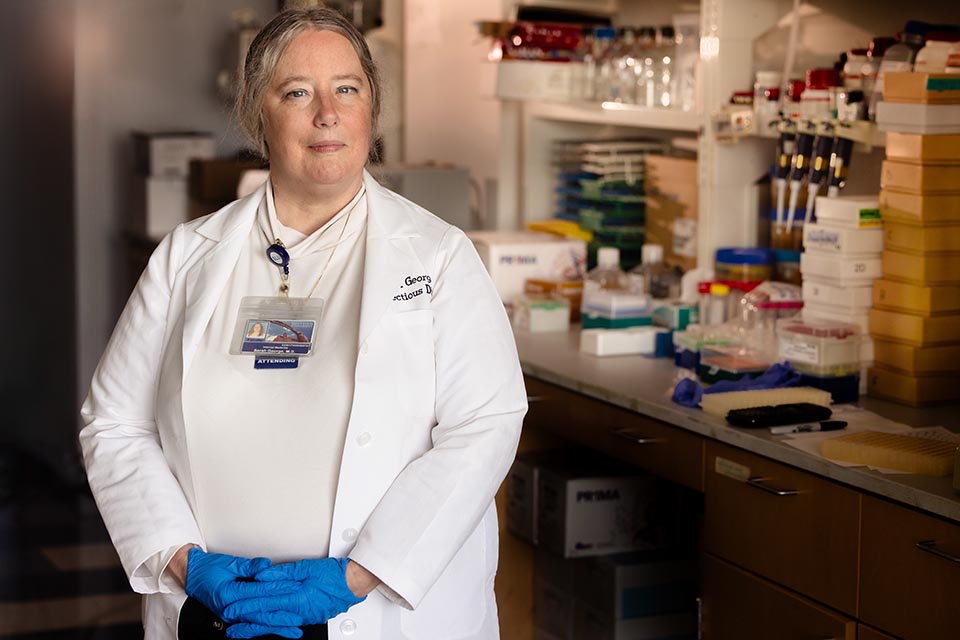SLU Vaccine Center Will Enroll Healthy Volunteers in West Nile Virus Clinical Trial
05/13/2025
ST. LOUIS -- Saint Louis University's Center for Vaccine Development will enroll up to 30 adult volunteers in a clinical trial to study the safety and immune response elicited by a new investigational vaccine for West Nile virus. Currently, there is no approved vaccine or treatment for illness caused by West Nile virus. A previous study of an earlier version of this vaccine showed the vaccine was safe and well tolerated. Building on these findings,this new study will assess an updated version of the vaccine.

Sarah George, M.D., professor of infectious diseases, allergy and immunology and researcher in SLU's Center for Vaccine Development, serves as principal investigator of the new clinical trial. Photo by Sarah Conroy.
West Nile virus is transmitted to people primarily through the bite of an infected mosquito, though it also can be contracted through blood transfusions, organ transplants, and from an infected mother to baby during pregnancy, delivery, or breastfeeding. The virus has been reported in the U.S. since 1999.
While most West Nile virus infections cause no symptoms, nearly 25% of people infected develop an acute febrile illness with headache, body aches, joint pains, vomiting, diarrhea, and rash. About 1 in 150 people infected with West Nile virus develop severe illness with neuroinvasive disease such as encephalitis (inflammation of the brain), meningitis (inflammation of the membranes around the brain and spinal cord), and acute flaccid paralysis (sudden onset of muscle weakness). Most people who develop neuroinvasive disease are over 60 or have a weakened immune system.
Between 1999 and 2022, there were 28,684 cases of neuroinvasive disease and 2,641 deaths caused by West Nile virus in the U.S. However, doctors believe the actual occurrence of disease due to West Nile virus may be much higher, with estimates of nearly 3 million infections resulting in approximately 800,000 illnesses in the U.S. between 1999-2010.
Sarah George, M.D., professor of infectious diseases, allergy and immunology and researcher in SLU's Center for Vaccine Development, serves as principal investigator of the new clinical trial. She says it is vital that we develop an effective vaccine investigator of the order to protect both healthy and vulnerable people.
"Currently, we do not have a vaccine which prevents West Nile virus disease," George
said. "The disease can cause brain disease, paralysis, or sometimes death in people
who are aged or have weak immune systems, so we need to develop a safe protective
vaccine as a
tool in our arsenal against the virus."
The SLU Vaccine Center will be the only research site for the Phase 1 clinical trial.
Study investigators will enroll healthy adult volunteers between the ages of 18 and 49 in the clinical trial. Researchers will study the safety and effectiveness of two different dose levels of an investigational vaccine given on three occasions. Participants will be randomly assigned to receive the West Nile virus vaccine or a placebo.
The study will last around 13 months and will require a number of visits and phone calls. Study participants will be compensated for their time and participation in the study.
Interested participants should contact the Saint Louis University Center for Vaccine Development at:
- Email: vaccine@slu.edu
- Telephone: 314-977-6333
For more information about the trial, visit ClinicalTrials.gov. The study's Clinical Trials Identifier is NCT02337868. The study is funded by the National Institute of Allergy and Infectious Diseases (NIAID), part of the National institutes of Health.
Saint Louis University Center for Vaccine Development
Saint Louis University has been on the front lines in the fight against pandemics and global health crises for more than three decades and first received federal funding for vaccine research in 1989.
Led by Daniel Hoft M.D., Ph.D., SLU's Center for Vaccine Development is one of only 10 institutions selected by the National Institutes of Health as a Vaccine and Treatment Evaluation Unit(VTEU).
As a VTEU, the Center helps develop and evaluate vaccines that will protect people from infectious diseases and emerging threats. It conducts Phase 1 through 4 vaccine and treatment trials, including clinical studies in collaboration with industry partners.
Saint Louis University School of Medicine
Established in 1836, Saint Louis University School of Medicine has the distinction of awarding the first medical degree west of the Mississippi River. The school educates physicians and biomedical scientists, conducts medical research, and provides health care on a local, national and international level. Research at the school seeks new cures and treatments in five key areas: infectious disease, liver disease, cancer, heart/lung disease, and aging and brain disorders.







